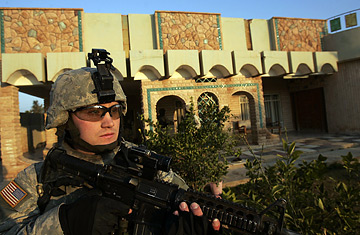
Lt. Jacob Right of the Pennsylvania National Guard, 28th Infantry Division, stands guard during a house search during joint US-Iraqi Army operation in the Ramadi area.
Monday's announcement by the Pentagon that it may call up to 13,000 National Guard troops for duty in Iraq was something of a milestone. Several thousand of these troops would be going to Iraq for a second time — the first return trip for large units of the National Guard since the war began.
The good news is that the brigades, from Arkansas, Indiana, Ohio and Oklahoma, would have plenty of time to get ready before heading to the war zone around Christmastime or early in 2008. The bad news is that the outcome of the war in Iraq will most likely be all but decided by then. "If we don't get the surge right, it's all going to be irrelevant," says Andrew Krepinevich, president of the Center for Strategic and Budgetary Assessments, "because in nine to 12 months we will have lost the war." Those are grim words coming from a retired Army officer and West Point graduate, but they raise an important concern: No one wants to be the last soldier to die for a losing cause.
U.S. military officials from Baghdad to the Pentagon have made it clear that by Labor Day Washington should have a good handle on whether or not the surge plan championed by Army General David Petraeus, the top U.S. commander in Iraq, is working. The 30,000 extra troops, largely dedicated to Baghdad, are designed to secure the capital and let the political process take root. While the Guard deployment announced Monday is not part of the surge, by the time those soldiers board airplanes bound for Iraq it should be apparent whether or not the surge is working. Older and a more integral part of their local communities, these politically potent soldiers are not going to be pleased if it appears they are being thrown into a losing battle.
Guard forces normally report to their state's governor, and are often used for national disasters at home. But they can be federalized — and become part of the deployed overseas Army — if needed. It's one thing for such part-time troops to be called to action in the early days of a military campaign, when the gung-ho spirit and patriotism are at their peak. But it's quite another to be sending these people with established careers and lives outside the military back to Iraq in the war's fifth year. Because former Defense Secretary Donald Rumsfeld kept a ceiling on the Army's troop strength, the National Guard and reserve forces have become a key piece of the everyday Army — rather than being held in reserve for any unexpected conflict that erupts while the active-duty force is pinned down elsewhere. Even supporters concede the Guard has been so stretched — and has left so much gear behind in Iraq — that they would now be hard-pressed to perform their stateside duties. (The active duty army is feeling the strain too; the Pentagon is considering a plan to extend the tours of up to 15,000 troops currently in Iraq by up to three months.)
"In the past, the Guard and Reserve were a strategic reserve," General Peter Schoomaker, the Army chief of staff, told Congress last month. "They're now part of the operating force of the United States Army." Acting Army secretary Pete Geren agreed. "They have carried a heavy burden in the war," he said. "A third of our soldiers that are deployed have come from the Guard and Reserve and we're going to continue to look to them as part of the frontline force."
Just how willing they're going to be remains to be seen. "I've never seen the Guard and Reserve in a more dispirited state than they are right now," Rep. Dave Obey, a Wisconsin Democrat, told Defense Secretary Robert Gates when he appeared before the House Appropriations defense subcommittee March 29. "They are a crucial asset to this country and right now they are in big trouble." Gates responded that one of his biggest concerns before he took on the job of defense chief was "that we were stressing the National Guard too much." A key goal for Gates and Petraeus is to make sure that, assuming the Guard units are deployed, they won't be fighting in a losing cause.
